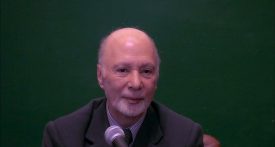Search results for tag "God" - 9 answer(s)
171
Vote
In his poem entitled “The Quintessence of Religions”, Ostad Elahi lays out in a few verses what he considers to be the result of a lifetime of experience. This “(quint)essential” summary brings to light, among other things, the relationship between ethical and divine principles. Leili Anvar made it the subject of a conference she gave in 2011 on the occasion of the “Day of human solidarity”, the video of which was posted on this very site. The text published in the proceedings of the symposium (Quelle sagesse pour notre temps ?) is a revised and more detailed version of her oral contribution.
Read more
408
Vote
What is prayer? What function does it have in our lives and how do we practice it? E-ostadelahi.com drew a few questions on this theme from interviews conducted with six public figures. From the actor to the priest, to the intellectual, to the dancer, all answer these questions in their own words.
Following this video, you too will have the opportunity to define the personal meaning you give to prayer by participating in a short poll.
Read more
775
Vote
Natural spirituality gives a central role to reason, but it also recognises the full value of positive emotions in the process of perfection.
In this question and answer session concluding a lecture he gave at the Sorbonne (Paris) in November 2011, Professor Elahi discusses this subjective or lived dimension of self-knowledge. He touches upon the specific emotion that derives from our relationship to Truth and the divine, as well as the incomparable joy—at once powerful, light and profound— that comes with the understanding of real divine truths.
Read more
309
Vote
Anyone who has ever been in love has had that experience when thinking about the person they love: the sensation of the presence of the beloved can fill up your mental space to such an extent that it will accompany you at every moment and in every situation. When you are in love, this presence settles within you automatically and effortlessly. It can even be reflected around you in the smallest events. If you are not in love, you can still stir up a similar experience by directing your thought toward someone and attempt to develop positive feelings toward them and thereby experience the “presence” of this person. Such experiences are internal and multiform, and can be more or less intense depending in particular on how much attention we pay to them.
Read more
863
Vote
Pascal was right: proofs of the existence of God are of no avail when it comes to giving faith to the faithless. To realize that a divine scheme is at work in the universe requires more than rational arguments. What, then, is needed? In Knowing the Spirit (p. 45), Ostad Elahi provides the reader with a clue. He speaks of the voice of conscience as an inner device capable of attesting to the existence of God. Now, what does voice of conscience mean? Where does it come from and how exactly can it lead us to acknowledge the existence of God?
Read more
487
Vote
In order to gauge the ethical quality of our conduct, there are many factors to be considered, such as the motivation and intention behind a certain course of action. But how does our intention matter, if in most cases we are not even sure what it is? In what sense can intention affect our spiritual growth? These are delicate issues. Here are some reflections from one of our readers that we found worth sharing.
Read more
476
Vote
In elaborating proofs for God’s existence, oriental and occidental philosophers alike did not necessarily intend to instil faith in those who were lacking it. When he wrote chapter 1 of Knowing the Spirit, which deals exclusively with this very question, Ostad Elahi was well aware that none of the arguments he presented could actually prove […]
Read more
519
Vote
Generosity, for one who is so inclined by nature or by habit, is relatively undemanding, for it does not require any costly sacrifice. It is quite another matter when ethical concern requires us to renounce a pleasure or craving, or when it runs up against a selfish nature. To overcome such resistance, willpower alone does not always suffice. When self-denial costs us something, we require the aid of a particular type of energy, one that is also known as “grace”.
Read more
371
Vote
In attempting to reconcile faith and reason, philosophers have produced what is traditionally called “proofs of the existence of God”. These proofs usually present themselves as sophisticated arguments. As such, they are open to disputation and, one must admit, hardly convincing. It is by reference to them that Pascal wrote: “The metaphysical proofs of God are so remote from the reasoning of men, and so complicated, that they make little impression; and if they should be of service to some, it would be only during the moment that they see such demonstration; but an hour afterwards they fear they have been mistaken.” (Pensées, 543)
Read more
|

 News
News Podcast
Podcast











Recent Comments